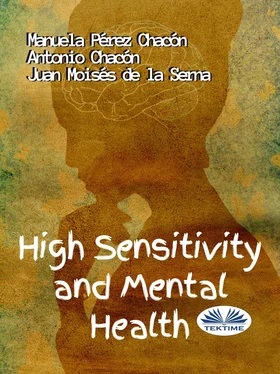The highly sensitive person can be identified by the high levels of sensitivity he or she exhibits. These are people who are easily excited by the stimuli around them. Other characteristics to take into account are empathy and the ability to grasp information from their surroundings.
Those who possess the trait of high sensitivity, process information in a peculiar way. They analyze everything more thoroughly. They can understand how the other person feels and take the emotions they perceive to the extreme. Therefore, when day-to-day emotions are positive (joy, calmness, optimism, etc.), the HSP can control what he or she feels to his or her benefit. In this case, it is an advantage to be a highly sensitive person. Although, since it is a genetic trait, it’s not something you can choose to be. You are simply born or not born with the trait of high sensitivity.
On the other hand, when the person is faced with a complex routine full of negative emotions (anger, sadness, anguish, etc.), psychological problems may appear. It is common to encounter difficult situations throughout life. That’s what living is all about, having all kinds of experiences and learning how to deal with them. However, for the highly sensitive person, it is often difficult to make decisions because of emotional factors that are difficult to control.
The most common difficulties that arise after mismanagement of high sensitivity are low self-esteem, anxiety, stress, phobias, depression, and even borderline personality disorder. Some of the symptoms that indicate the need to seek professional help are insomnia, muscular pain, low mood, emotional tension, anger, etc. In children, symptoms such as insecurity, shyness, attention deficit, and irritability stand out.
This is not to say that highly sensitive people are more likely to experience psychological symptoms just because they were born with the trait of high sensitivity. We want to say that perhaps having greater sensitivity to stimuli may increase the activation of the person in general. That is, if a highly sensitive person has many experiences that generate extreme or negative emotions, he or she is exposing him or herself to more pressure. Their body is stressed by situations that may go unnoticed by people who are not highly sensitive. It is also possible that the sum of stressful experiences may cause physical symptoms in the highly sensitive person that would not even affect anyone else.
The brain of the highly sensitive person pays more attention to sensations in his body that could be considered insignificant whereas other people do not perceive these sensations. It remains to be seen whether highly sensitive people go to the doctor more because of problems or complaints that cannot be diagnosed as a specific disease.
One thing we do know is that highly sensitive people become more saturated with less stimulation than other people. Their sensory threshold is lower. That is, they are more affected by stimuli and therefore are more easily overexcited or overstimulated. No one works well under pressure or under the effects of overstimulation nor do we all perform equally well at work or school when faced with tasks that involve too much emotional stress.
It is, therefore, imperative for the highly sensitive person to learn to manage this intense influx of information when it causes problems in their routine. This will allow them to carry out daily tasks with peace of mind and naturalness. The solution should not be to refuse activities, but rather to get to know oneself well and develop psychological strategies. Social skills can also be learned or encouraged. It’s is especially important to do a self-assessment in line with one’s own emotions.
The emotional reaction of a highly sensitive person is more extreme or notable than that of any other person, even in the same situation. For example, two brothers of similar age are watching a dramatic movie, one of them cries desperately and the other does not. These situations need not be traumatic for the highly sensitive person, as long as they have learned to identify with their trait and accept what they cannot change about themselves.
A fairly common repercussion for highly sensitive people who have not identified their trait is to try to change the way they are. Fighting against one’s nature is impossible and inadvisable. The perfectionism and self-criticism developed by the highly sensitive person must be aimed towards self-benefit. The key to healthy self-esteem for highly sensitive people lies in preventing these two traits from becoming disadvantages or psychological problems.
Therefore, good management of high sensitivity consists of taking advantage of such sensitivity thus avoiding the usual inconveniences that arise so that they do not lead to psychological problems such as anxiety, depression, or stress.
In short, highly sensitive people perceive stimuli more intensely, generating greater vividness in their emotions. The emotions that any person generates in their daily life can be positive or negative. The positive ones are, for example, joy, happiness, or enthusiasm. Whereas the negative ones can be sadness, apathy, or anguish. The highly sensitive person is more sensitive to stimuli. This means greater activation in general and, therefore, greater pressure and discomfort in the face of negative emotions. Increased emotional stress, coupled with not knowing how to manage one’s emotions, can lead to psychological symptoms and even the onset of health problems. Therefore, people who identify with the trait of high sensitivity must learn to manage their emotions. Achieving this can sometimes be a challenge, or it can simply come naturally. By managing this skill, psychological problems, such as anxiety or stress, can be avoided.
References
Aron, A., Ketay, S., Hedden, T., Aron, E. N., Rose Markus, H. and Gabrieli, J. D. (2010). Temperament Trait of Sensory Processing Sensitivity Moderates Cultural Differences in Neural Response. Social Cognitive and Affective Neuroscience, 5(2-3), 219-226.
Aron, E. N.andAron, A. (1997). Sensory-processing Sensitivity and its Relation to Introversion and Emotionality. Journal of Personality and Social Psychology, 73(2), 345–368.
Aron, E. N., Aron, A. and Jagiellowicz, J. (2012). Sensory Processing Sensitivity: A Review in the Light of the Evolution of Biological Responsivity. Personality and Social Psychology Review, 16(3), 262–282.
Dabrowski, K. (1964). Positive Disintegration. Little Brown.
Dabrowski, K. (1967). Personality Shaping Through Positive Disintegration. Little Brown.
Dabrowski, K. (1972). Psychoneurosis Is Not An Illness. Gryf Publications.
Dabrowski, K., Kawczak, A. and Piechowski, M. M. (1970). Mental Growth: Through Positive Disintegration. Gryf Publications.
Dabrowski, K.andPiechowski, M. M. (1977). Theory of Levels of Emotional Development. Volumes I and II. Dabor Science Publications.
Díaz-García, M. I. and Díaz-Sibaja, M. A. (2005). Daily Problems in Childhood Behavior. M.I. Comeche and M.A. Vallejo (Coor.), Therapy Manual of Childhood Behavior. Dykinson.
Pluess, M. (2017). Vantage Sensitivity: Environmental Sensitivity to Positive Experiences as a Function of Genetic Differences. Journal of Personality, 85(1), 38-50 - https//doi.org/10.1111/jopy.12218
Chapter 2. Characteristics of the Highly Sensitive Person
The highly sensitive person perceives the stimuli they receive from the environment around them focusing on the details. It is a process that is carried out unconsciously, almost without realizing it. All the information that a person receives through the senses, in new situations, is carefully analyzed. Sight, hearing, taste, touch, and smell are at the same level of development as in a non-HSP person, however, the perception received through these organs is more enhanced in the HSP.
Читать дальше












